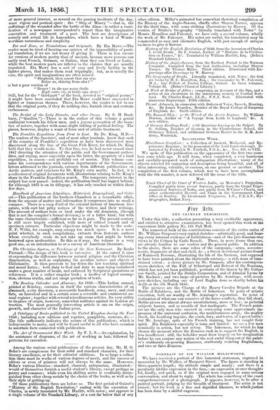,fiut Artw.
THE CRIMEAN EXHIBITION.
Under this title, a collection presenting a very creditable appearance, and entitled to attentive examination, has been opened this week at the convenient little gallery No. 121 Pall Mall.
The numerical bulk of the contributions consists of the entire series of Mr. William Simpson's very capital sketches—artistically good, and bear. ing every internal evidence of faithfulness—and of the prai-Russian-war views in the Crimea by Carlo l3ossoli. These, in more forms than one, are already familiar to our readers and the general public. In additiea to the above there are some relies of the campaign,—arms, accoutre- ments, fragrhents of shot and shell, &e. ; a Greek devotional picture found at Kamiesch Boroune, illustrating the life of the Saviour, and supposed to have been painted about the thirteenth eantury,—a rich mass of time- stained colour ; a clever picture by Mr. Simpson after his contempora- neous sketches, of the Fall of Sebastopol and Simpson, of the Russians, which has not yet been published ; portraits of the Queen by Mr. Catter son Smiih, painted for the Dublin Corporation and of Admiral Lyons by Mr. Buckner ; and two large oil-pictures by hir. Armitage, with acces- sory sketches, including one of Lord Raglan done so shortly before Ilia death as the 5th March 1866.
The pictures are the Charge of the Heavy Cavalry Brigade at the Battle of Balaklava, and the Battle of Inkerman. In point of artistic execution, both are worthy of Mr. Armitage's reputation. In point of realization of what one can conceive of the fierce conflicts, they fall short. Battle-pieces are almost always unsatisfactory, more or less ; as pictorial subjects barren, and as records of fact inadequate. The French paint- ers are the only men who succeed in conveying some approximate im- presaiQn of the universal confusion, the multitudinous array, the mighty shock, the headlong impulse, the crash, fury, and terror, of a great battle : but Mr. Armitage spite of his French training, has not caught their spirit. His Balaklava especially is tame and limited : we see a few men nominally in action, but not acting. The Inkerman, for whiah he has chosen the moment where the Zouaves rush in to support the English, is less insufficient : still, the beholder must draw largely on his imagmation before he can conjure any notion of the real awful thingoutof the amt. er's stubbornly on-pouring Russians, stubbornly resisting
and two or three Zoeaves.


























 Previous page
Previous page